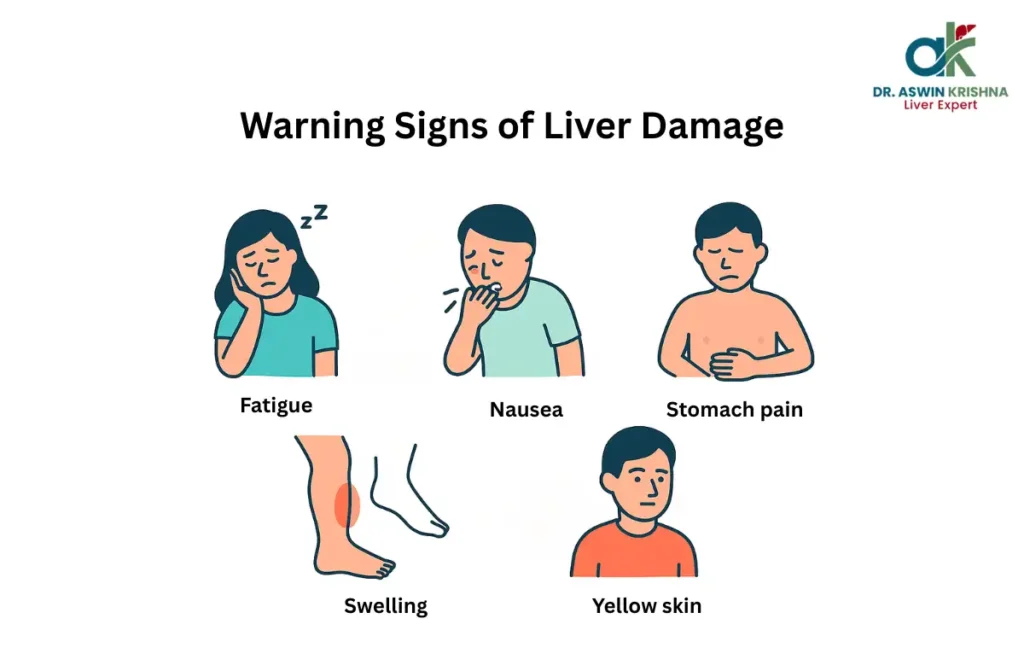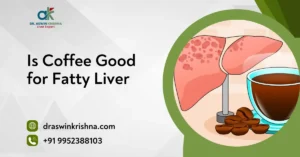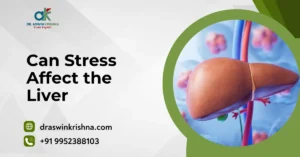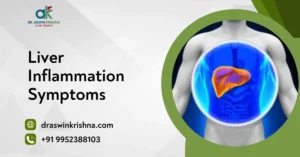Understanding the early signs of liver damage is crucial for timely medical intervention and preventing further harm. The liver, a key player in detoxifying the body, processing nutrients, and supporting metabolism, can be silently compromised. Symptoms like fatigue, unexplained weight loss, and a slight yellowing of the skin or eyes can be subtle yet indicative of underlying issues. Recognizing these signs early can lead to a better prognosis and prevent severe liver-related health complications.
Why is liver health important?
- The liver acts as the body’s main detoxification hub, filtering toxins from the blood, breaking down waste, and metabolizing nutrients. If its function declines, it affects digestion, immunity, energy, and hormone balance. Detecting early warning signs of liver damage can prevent irreversible complications.
- This organ stores essential vitamins and minerals, regulates cholesterol, and produces bile for fat digestion. Even minor disturbances can cause symptoms such as weakness, mood changes, and abdominal bloating, which may signal what are the early signs of liver damage.
- A healthy liver supports safe medication use by efficiently processing drugs and reducing harmful buildup. When damaged, it may cause reactions or side effects, especially in those already showing early signs of liver damage from medication.
- While the liver has a remarkable ability to regenerate, long-term or repeated injury can overwhelm its repair capacity. Addressing any early warning signs of liver damage quickly is vital for preserving function and preventing chronic disease.

Early Signs of Liver Damage: What You Need to Know
The liver plays a vital role in digestion, metabolism, and detoxification. However, when it becomes damaged, the effects can be severe. Recognizing the early signs of liver damage is crucial for prompt medical intervention. Below are 14 signs to watch out for:
1. Enlarged Liver or Spleen
An enlarged liver (hepatomegaly) or spleen (splenomegaly) can be a sign of underlying liver disease. This can lead to pain or a feeling of fullness in the upper right abdomen. It is often associated with conditions like cirrhosis, fatty liver disease, or hepatitis.
2. Excess Breast Tissue in Men
Liver dysfunction can cause hormonal imbalances, leading to gynecomastia, or the enlargement of breast tissue in men. This is often due to the liver’s reduced ability to process estrogen. Long-term liver disease, especially alcoholic fatty liver disease symptoms, can trigger this condition.
3. Swollen Abdomen Due to Fluid Retention
A buildup of fluid in the abdomen, known as ascites, is a serious indicator of advanced liver disease. This is a common side effect of liver failure and often results from portal hypertension. Patients may experience discomfort, shortness of breath, and increased abdominal pressure.
4. Reddened Palms
Palmar erythema, or redness of the palms, is commonly associated with liver damage. It is often linked to hormonal changes caused by liver dysfunction. The condition occurs due to increased blood flow to the hands and is a common sign in those suffering from symptoms of liver damage from alcohol.
5. Red Spider-Like Blood Vessels on the Skin
Spider angiomas, or small, red, web-like blood vessels, often appear on the skin due to excess estrogen in the bloodstream. This is frequently seen in individuals with chronic liver disease, particularly in alcohol-related liver cases. These marks typically appear on the face, neck, chest, and arms.
6. Small Testicles
Chronic liver disease can cause reduced testosterone levels, leading to testicular shrinkage, a common side effect of liver disease. This occurs due to the liver’s inability to metabolize hormones efficiently, causing an imbalance that affects reproductive health.
7. Widened Veins in the Wall of the Abdomen
Portal hypertension, a complication of liver disease, can lead to enlarged abdominal veins. This is often seen in advanced stages of alcoholic fatty liver disease symptoms and can cause varices, which may rupture and lead to severe internal bleeding.
8. Yellow Eyes or Skin (Jaundice)
Jaundice occurs when the liver fails to process bilirubin, causing yellowing of the skin and eyes. It is one of the most noticeable early signs of liver damage. This condition often indicates severe liver dysfunction, such as hepatitis, liver cirrhosis, or bile duct obstruction.
9. Abdominal Pain
Persistent discomfort in the upper right abdomen is a sign of liver inflammation or enlargement due to liver disease. This pain may worsen after eating fatty foods or drinking alcohol, common triggers for those with symptoms of liver damage from alcohol.
10. Loss of Appetite
A damaged liver can lead to metabolic disturbances, reducing hunger and leading to significant weight loss over time. Poor appetite is frequently reported in individuals with cirrhosis, hepatitis, or alcoholic fatty liver disease symptoms.
11. Fatigue
Chronic liver disease often causes fatigue due to the buildup of toxins that the liver can no longer effectively remove. This condition is often accompanied by brain fog and difficulty concentrating, significantly affecting daily life.
12. Nausea and Vomiting
As the liver struggles to eliminate toxins, nausea and vomiting become common side effects of liver disease. This can also be exacerbated by liver inflammation, making digestion difficult and leading to malnutrition over time.
13. Changes in Stool and Urine
Dark urine and pale, clay-colored stools indicate bile flow issues, often seen in cases of alcoholic fatty liver disease symptoms. If bile is not properly excreted, it can lead to digestive problems and nutrient malabsorption.
14. Extreme Weight Loss
Severe, unintentional weight loss is a sign of advanced liver disease and often occurs alongside muscle wasting. This condition, known as cachexia, is common in end-stage liver failure and indicates a critical need for medical intervention.

What Causes Liver Damage?
- Viral Hepatitis (B and C): These infections inflame liver tissue and, if untreated, may lead to cirrhosis or cancer. Many cases are detected only when early warning signs of liver damage become noticeable through blood tests.
- Alcohol Consumption: Drinking heavily over time causes fat buildup, inflammation, and scarring. Recognizing an early sign of alcohol induced liver damage—such as appetite loss—can help stop progression.
- Medications & Toxins: Certain drugs, like high-dose acetaminophen, and herbal supplements can cause injury. Monitoring for early signs of liver damage from medication—such as jaundice or dark urine—can prompt swift discontinuation.
- Metabolic Disorders: Obesity and diabetes can lead to fat deposits in liver cells, a condition known as nonalcoholic fatty liver disease. Patients often ask what are the early signs of liver damage to detect these silent changes early.
- Autoimmune & Genetic Disorders: Autoimmune hepatitis and conditions like Wilson’s disease cause ongoing injury if undiagnosed. Awareness of the early signs of liver damage from alcohol or other causes helps doctors detect these earlier.
Can Liver Damage Be Reversed?
- Reversal depends on how advanced the damage is and its cause. Short-term injuries, such as mild toxin exposure, often heal if the trigger is removed quickly.
- Stopping a harmful drug when early signs of liver damage from medication are found greatly improves recovery chances, especially when combined with supportive care.
- Viral hepatitis can be treated with antiviral medications, and sustained alcohol abstinence may reduce scarring. Weight loss and blood sugar control can also reverse fatty liver disease in early stages.
- Recognizing early warning signs of liver damage—like unexplained fatigue, pale stools, or mild jaundice—can significantly improve the odds of restoring normal function.
Why Alcohol Damages the Liver
- Long-term heavy drinking leads to cirrhosis, portal hypertension, and increased cancer risk. Identifying what are the early signs of liver damage are and acting early can prevent these outcomes.
- The liver metabolizes alcohol into acetaldehyde, a highly toxic substance that injures cells and promotes inflammation. Over time, this disrupts fat metabolism and causes fibrosis.
- An early sign of alcohol induced liver damage may be persistent fatigue, while early signs of liver damage from alcohol include nausea and mild abdominal discomfort.
- Even without symptoms, blood tests may reveal elevated enzymes, marking the early warning signs of liver damage. Stopping alcohol at this stage offers the best chance of recovery.
How Liver Damage Progresses
- Liver damage usually begins at the cellular level, where continuous exposure to alcohol, toxins, infections, or medications triggers inflammation in liver tissues. Over time, this persistent irritation causes fat accumulation, one of the early signs of liver damage from medication or alcohol. If untreated, the liver gradually loses its ability to filter toxins and regulate metabolic processes.
- As the damage advances, inflammation becomes chronic and leads to fibrosis, a stage where scar tissue forms and replaces healthy liver cells. This scarring restricts blood flow through the organ, worsening functional decline and accelerating disease progression. At this stage, people may notice early signs of liver damage from alcohol, such as fatigue, abdominal discomfort, or unexplained nausea.
- When fibrosis becomes extensive, the condition progresses to cirrhosis, characterized by severe scarring and irreversible structural changes. Cirrhosis disrupts detoxification, hormone balance, and nutrient metabolism, leading to complications like jaundice, fluid retention, and cognitive difficulties. Early intervention at the stage of early warning signs of liver damage can significantly slow or halt progression.
Diagnosis of Liver Damage
- Diagnosis typically begins with a detailed medical history focusing on alcohol use, medication habits, and exposure to hepatitis viruses or chemicals. Doctors also assess symptoms such as abdominal pain, tiredness, and the early sign of alcohol induced liver damage, including mild yellowing of the eyes or dark urine. These clues guide initial diagnostic pathways.
- Blood tests such as liver function tests (LFTs) help identify enzyme elevations that indicate stress or inflammation in liver tissues. Additional tests like bilirubin levels and clotting profiles offer insight into the liver’s ability to process toxins and synthesize essential proteins. Elevated enzymes are often among the early signs of liver damage from medication and other causes.
- Advanced imaging techniques, including ultrasound, CT scans, or MRI, provide a clearer picture of liver size, fat accumulation, and structural abnormalities. In more complex cases, a liver biopsy is performed to confirm the extent of fibrosis or cirrhosis. These assessments allow clinicians to differentiate between alcohol-related, medication-related, and metabolic causes.
Treatment and Management of Liver Damage
- Treatment focuses on eliminating the underlying cause, such as stopping harmful medications or reducing alcohol intake to prevent further injury. Recognizing the early signs of liver damage from alcohol or medications allows patients to take corrective action early. Lifestyle adjustments—like limiting processed foods and avoiding toxins—also support recovery.
- Medications may be recommended to treat infections, reduce inflammation, or control complications like fluid buildup and portal hypertension. Patients with fatty liver linked to alcohol often improve significantly after sustained abstinence. Those experiencing early warning signs of liver damage benefit most from prompt medical intervention and ongoing monitoring.
- In advanced conditions such as cirrhosis, management includes treating complications like variceal bleeding, ascites, or hepatic encephalopathy. Nutritional therapy becomes essential, as malnutrition worsens disease severity. When liver failure becomes irreversible, transplantation may be the only long-term solution.
Preventing Liver Damage
- Limiting alcohol consumption is one of the most effective preventive measures, as excessive drinking is a major trigger for the early sign of alcohol induced liver damage. Moderation allows the liver to regenerate and prevent fat accumulation, inflammation, and scarring from developing. Individuals with a family history of liver disease should be especially cautious with alcohol intake.
- Practicing medication safety is equally important, particularly with painkillers, antibiotics, and herbal supplements that can overload the liver. Monitoring for the early signs of liver damage from medication helps identify harmful reactions before they worsen. Reading labels carefully and avoiding self-medication significantly reduces risk.
- Maintaining a healthy lifestyle through balanced nutrition, regular exercise, and weight management helps prevent fatty liver disease. Vaccination against hepatitis A and B offers protection from viral causes of liver injury. Recognizing early warning signs of liver damage—such as persistent fatigue, abdominal discomfort, or digestive changes—encourages timely evaluation and prevents long-term complications.
Conclusion
Identifying the early signs of liver damage plays a pivotal role in safeguarding health and preventing irreversible liver disease. Early detection facilitates timely treatment, halting disease progression and enabling potential reversal of damage. Symptoms like abdominal discomfort, persistent fatigue, and skin changes should prompt immediate medical evaluation. Proactive attention to these early signs can significantly improve long-term health outcomes and liver function.
Read also Fatty Liver Specialist in Chennai.



